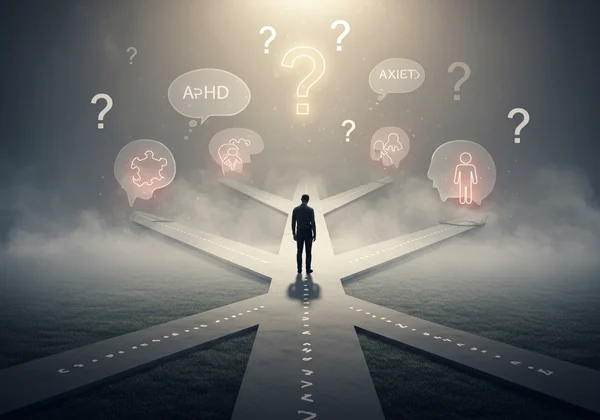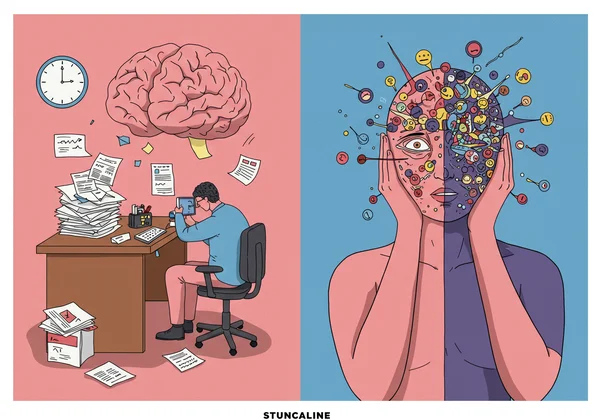Bin ich autistisch? Quiz: Verständnis von Fehldiagnosen bei Erwachsenen und ADHD-Überlappung
October 11, 2025 | By Phoebe Harrington
Fühlen Sie sich manchmal so, als würden Sie nicht ganz dazugehören, aber keine einzelne Erklärung scheint Ihre gesamte Erfahrung zu erfassen? Für viele Erwachsene ist der Weg zur Selbsterkenntnis ein gewundener Pfad, erfüllt mit verwirrenden Zeichen und überlappenden Symptomen. Wenn Sie sich je gefragt haben, „Bin ich autistisch?“, nur um sich beim Vergleichen der Merkmale von Autismus, ADHD, Angst und anderen Bedingungen zu verlieren, sind Sie nicht allein. Dieser Leitfaden hilft Ihnen, diese komplexe Landschaft zu navigieren. Wir werden erkunden, warum Fehldiagnosen so häufig vorkommen, und zeigen, wie ein wissenschaftlich fundierter Autismus-Quiz ein mächtiger erster Schritt zur Klarheit sein kann.
Der Pfad zur Selbsterkenntnis kann verwirrend sein, aber das Verständnis der Nuancen ist der Schlüssel, um ein authentischeres Selbst zu entfalten. Für diejenigen, die bereit sind zu beginnen, bietet ein vertrauliches Online-Screening-Tool wertvolle Einblicke.

Das Verständnis der Autismus- und ADHD-Überlappung in der Neurodivergenz
Autismus-Spektrum-Störung (ASD) und Aufmerksamkeitsdefizit-Hyperaktivitätsstörung (ADHD) sind beide neurodevelopmentale Störungen, was bedeutet, dass sie in der Gehirnentwicklung ihren Ursprung haben. Es ist äußerst häufig, dass sie zusammen auftreten oder dass ihre Merkmale überlappen, was ein diagnostisches Rätsel für Kliniker und eine verwirrende Erfahrung für Betroffene darstellt.
Gemeinsame Merkmale: Exekutivfunktionsstörungen und Sinnesempfindlichkeiten
Eines der größten Überlappungsbereiche liegt in den Herausforderungen der Exekutivfunktionen. Exekutivfunktionen sind die mentalen Prozesse, die es uns ermöglichen, zu planen, die Aufmerksamkeit zu fokussieren, Anweisungen zu merken und mehrere Aufgaben zu jonglieren. Sowohl autistische Menschen als auch Personen mit ADHD können mit der Organisation von Aufgaben, der Zeitverwaltung und der Impulskontrolle zu kämpfen haben. Dies kann sich in Schwierigkeiten beim Treffen von Fristen, einem dauerhaft unordentlichen Raum oder Problemen beim Starten und Beenden von Projekten äußern.
Eine weitere signifikante gemeinsame Erfahrung ist die Sinnesempfindlichkeit. Die Welt kann überwältigend wirken, sei es das Summen von Leuchtstofflampen, das Kratzen eines Etiketts an der Kleidung oder das Getöse in einem überfüllten Raum. Beide Erkrankungen können Hypersensibilität (übermäßige Reaktivität auf Reize) oder Hyposensibilität (verminderte Reaktivität) beinhalten, was dazu führt, dass Individuen bestimmte sensorische Eingaben suchen oder vermeiden, um sich reguliert zu fühlen.

Wichtige Unterschiede: Soziale Kommunikation vs. Aufmerksamkeitsregulation
Trotz der Ähnlichkeiten unterscheiden sich die zugrunde liegenden Gründe für bestimmte Verhaltensweisen oft. Der primäre Unterschied liegt in der sozialen Interaktion im Vergleich zur Aufmerksamkeit. Autistische soziale Unterschiede wurzeln oft in einer anderen Art der Verarbeitung sozialer Signale, des Verständnisses nicht-wörtlicher Sprache und des Engagements in reziproken Gesprächen. Eine autistische Person könnte eine Party meiden, weil die sozialen Anforderungen und die sensorische Umgebung erschöpfend sind.
Im Gegensatz dazu könnte eine Person mit ADHD sozial Schwierigkeiten haben aufgrund von Unaufmerksamkeit, Impulsivität oder Hyperaktivität. Sie könnten andere unterbrechen, nicht weil sie desinteressiert sind, sondern weil ihr Gehirn zu schnell läuft, um auf ihren Einsatz zu warten. Sie könnten während Gesprächen abschalten scheinen, nicht aus Mangel an Empathie, sondern aufgrund von Herausforderungen bei der anhaltenden Fokussierung. Das Verständnis dieser zugrunde liegenden Motivationen ist entscheidend für die Differenzierung.
Warum Autismus-Fehldiagnosen bei Erwachsenen so häufig sind
Viele Erwachsene, insbesondere die bei der Geburt als weiblich zugewiesen wurden, erreichen das Erwachsenenalter ohne ein angemessenes Verständnis ihres Neurotyps. Sie könnten unterwegs andere Diagnosen gesammelt haben – wie Angst, Depressionen oder BPD –, die nie ganz richtig gepasst haben. Dies geschieht aus mehreren systemischen und persönlichen Gründen.
Die Rolle von Maskieren und Kamouflage bei Erwachsenen
Maskieren oder Kamouflage ist der bewusste oder unbewusste Akt, natürliche autistische Merkmale zu verbergen, um sich in neurotypische Peers einzufügen. Dies kann das Erzwingen von Augenkontakt, das Nachahmen sozialer Verhaltensweisen anderer, das Skripten von Gesprächen und das Unterdrücken repetitiver Verhaltensweisen (Stimming) umfassen. Obwohl es eine nützliche Überlebensstrategie ist, ist Maskieren mental und emotional erschöpfend. Es kann zu autistischem Burnout führen und macht es unglaublich schwierig für Kliniker – und sogar für die Betroffenen selbst –, die zugrunde liegenden autistischen Merkmale zu erkennen. Die Erkundung dessen ist ein Schlüssel-Schritt, und ein Autismus-Maskierungs-Quiz kann eine strukturierte Möglichkeit bieten, über diese Verhaltensweisen nachzudenken.

Lücken in den Diagnosekriterien und Kliniker-Vorurteile
Historisch basierten die Diagnosekriterien für Autismus auf Studien junger, weißer Jungen. Dies hat eine signifikante Lücke im Verständnis geschaffen, wie Autismus bei Erwachsenen, Frauen und Menschen of Color auftritt. Viele Gesundheitsfachkräfte sind nicht ausreichend geschult, um subtile oder internalisierte Präsentationen von Autismus zu erkennen. Folglich könnten die tiefen, spezialisierten Interessen eines autistischen Erwachsenen als Hobby abgetan werden, oder ihre soziale Erschöpfung könnte als soziale Angststörung missverstanden werden, ohne weitere Untersuchung.
Das Entwirren von Ähnlichkeiten: Autismus vs. Angst & anderen Bedingungen
Die Verwirrung endet nicht mit ADHD. Mehrere andere psychische Bedingungen teilen Merkmale mit Autismus, was den Weg zu einem genauen Verständnis der eigenen Person weiter kompliziert.
Soziale Angststörung, PTSD und Borderline-Persönlichkeitsmerkmale
Soziale Angststörung ist vielleicht die häufigste Fehldiagnose bei autistischen Personen. Von außen sieht das Vermeiden sozialer Situationen gleich aus. Allerdings ist das Vermeiden bei einer autistischen Person oft auf sensorische Überlastung, Unterschiede in der Verarbeitung von Kommunikation und die schiere Erschöpfung durch Maskieren zurückzuführen. Bei jemandem mit sozialer Angststörung wird das Vermeiden typischerweise durch die Angst vor negativer Bewertung durch andere angetrieben.
Ähnlich können die intensiven emotionalen Reaktionen und Beziehungsprobleme, die bei der Borderline-Persönlichkeitsstörung (BPD) oder die Hypervigilanz bei der Posttraumatischen Belastungsstörung (PTSD) vorkommen, manchmal autistischen Merkmalen ähneln, wie emotionaler Dysregulation oder dem Bedürfnis nach Routine und Vorhersagbarkeit als Sicherheitsmechanismus.
Wenn eine Diagnose nicht ganz passt: Alternativen erkunden
Wenn Sie eine Diagnose erhalten haben, die nicht vollständig mit Ihrer gelebten Erfahrung übereinstimmt, ist es legitim, weiter nach Antworten zu suchen. Es geht nicht darum, Labels zu sammeln, sondern darum, ein Rahmenwerk zu finden, das Ihr Leben Sinn gibt, Ihre Stärken ehrt und Ihre Herausforderungen erklärt. Das Verständnis Ihres einzigartigen neurokognitiven Profils ist das Ziel. Ein vertrauliches Bin ich autistisch? Quiz kann ein niedrigschwelliger Weg sein, mehr Informationen zu sammeln und zu prüfen, ob die Erkundung einer Autismus-Abklärung der nächste Schritt sein könnte.
Die einzigartige Landschaft von Autismus und ADHD bei Frauen
Frauen werden mit Autismus und ADHD viel seltener als Männer diagnostiziert und oft viel später im Leben. Diese diagnostische Geschlechterlücke ist größtenteils auf gesellschaftliche Erwartungen und auf die unterschiedliche Präsentation der Merkmale zurückzuführen.
Wie autistische Merkmale bei Frauen anders auftreten
Autistische Frauen sind oft Meisterinnen des Maskierens. Sozialisierte von jungem Alter an, um anpassungsfähiger und sozial aufmerksamer zu sein, entwickeln sie ausgefeilte Kamouflage-Techniken. Ihre speziellen Interessen können auch „sozial akzeptabler“ sein – wie Literatur, Psychologie oder Tiere – und werden daher weniger wahrscheinlich als ungewöhnlich markiert. Sie haben oft ein starkes Verlangen nach Freundschaften, kämpfen aber mit den unausgesprochenen Regeln sozialer Dynamiken, was zu immenser Verwirrung und einem Gefühl führt, immer am Rande zu stehen und hineinzuschauen.

Der Einfluss gesellschaftlicher Erwartungen und Geschlechterrollen
Der gesellschaftliche Druck auf Frauen, emotional intuitiv und sozial anmutig zu sein, kann das autistisch sein besonders herausfordernd machen. Die ständige Anstrengung, diesen neurotypischen Erwartungen zu entsprechen, ist ein direkter Weg zum Burnout. Viele autistische Frauen berichten, dass sie sich in ihrem Alltag wie bei einer „Performance“ fühlen, eine tief isolierende und erschöpfende Erfahrung. Das Erkennen dieses Musters ist ein kritischer Teil des Selbsterkenntnisprozesses für viele. Wenn das bei Ihnen Anklang findet, könnte die Erkundung eines Quiz, das auf Autismus bei Frauen zugeschnitten ist, erleuchtend sein.
Ihr Weg zur Klarheit: Die Umarmung der Selbsterkenntnis
Die Navigation der komplexen Welt der Neurodivergenz kann überwältigend wirken. Die Überlappungen zwischen Autismus, ADHD, Angst und anderen Bedingungen sind real, und die Häufigkeit von Fehldiagnosen bei Erwachsenen – insbesondere Frauen – ist eine signifikante Barriere für die Selbstakzeptanz. Dennoch ist es möglich, diese Fäden zu entwirren.
Ihre Reise ist Ihre eigene, und jeder Schritt hin zu einem besseren Verständnis Ihrer selbst ist ein Schritt zu einem authentischeren und erfüllteren Leben. Es geht nicht darum, ein „Problem“ zu finden, das behoben werden muss, sondern darum, Ihr einzigartiges Betriebssystem zu entdecken und zu lernen, damit zu arbeiten.
Wenn Sie bereit sind, den ersten Schritt zu tun, laden wir Sie ein, Ihre Reise zu beginnen auf unserer Homepage. Die wissenschaftlich fundierten Tools auf unserer Plattform bieten einen sicheren, vertraulichen Raum, um Ihre Merkmale zu erkunden und personalisierte Einblicke zu gewinnen.
Häufig gestellte Fragen zu Autismus & koexistierenden Bedingungen
Bin ich autistisch, oder ist es etwas anderes? Das ist eine häufige und berechtigte Frage. Aufgrund der signifikanten Überlappung mit Bedingungen wie ADHD und sozialer Angst kann es von außen schwer zu unterscheiden sein. Der Schlüssel liegt oft im „Warum“ hinter dem Verhalten. Ein Online-Screening-Tool wie ein Autismus-Quiz kann Ihnen helfen, Ihre Merkmale aus einer neuen Perspektive zu analysieren und einen Datenpunkt für Ihre Selbsterkundung zu liefern.
Welche Anzeichen von Autismus gibt es bei Erwachsenen oder Frauen? Bei Erwachsenen und Frauen können die Anzeichen subtiler sein als die stereotypen Merkmale. Sie umfassen oft tiefe soziale Erschöpfung durch „Maskieren“, intensive spezielle Interessen an bestimmten Themen, Sinnesempfindlichkeiten (gegen Licht, Geräusche oder Berührungen), ein tiefes Bedürfnis nach Routine und eine Vorgeschichte des Gefühls, „anders“ zu sein oder intuitiv soziale Situationen zu navigieren.
Kann ein Online-Quiz Autismus diagnostizieren? Nein, und es ist entscheidend, diesen Unterschied zu verstehen. Online-Quizzes sind Screening-Tools, keine diagnostischen Instrumente. Sie können anzeigen, ob Sie eine signifikante Anzahl autistischer Merkmale haben und ob die Verfolgung einer formellen Bewertung durch einen qualifizierten Fachmann sinnvoll sein könnte. Denken Sie daran als an einen gut informierten ersten Schritt, nicht als finale Antwort. Ein kostenloses Autismus-Quiz ist ein risikofreier Weg, um zu beginnen.
Was sollte ich nach einem Autismus-Quiz tun? Nachdem Sie das Quiz ausgefüllt haben, nehmen Sie sich Zeit, über Ihre Ergebnisse nachzudenken. Der Bericht, insbesondere eine detaillierte KI-gestützte Analyse, kann Einblicke in Ihre Stärken, Herausforderungen und wie Ihre Merkmale das tägliche Leben beeinflussen, liefern. Der nächste Schritt liegt ganz bei Ihnen. Sie könnten sich entscheiden, mehr Recherche zu betreiben, sich online mit der autistischen Community zu verbinden oder den Bericht als Ausgangspunkt für ein Gespräch mit einem Therapeuten oder Arzt zu nutzen. Das Ziel ist Ermächtigung durch Wissen, und Sie können Ihre Ergebnisse abrufen, um zu beginnen.